Publications
This section presents publications relevant to land consolidation, featuring contributions from this EU-funded project, past work under the EU-FAO MAINLAND project, as well as independent publications by the EU or FAO
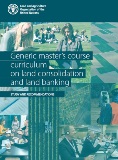
Generic master’s course curriculum on land consolidation and land banking
18/12/2023
The "Generic Master’s Course on Land Consolidation and Land Banking" is a crucial tool for capacity development, educating both aspiring and existing land tenure professionals. It offers a structured curriculum, teaching techniques, and resources, benefiting specialized students and current professionals in land-related fields. As part of an FAO initiative, it analyzes educational programs in 14 European universities, addressing skills demand in land consolidation across six countries.
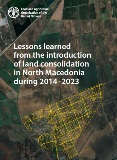
Lessons learned from the introduction of land consolidation in North Macedonia during 2014–2023
01/08/2023
This publication discusses the lessons learned from the implementation of a land consolidation program in North Macedonia from 2014 to 2023. The goal is to share these experiences in the hope that they can be useful for other countries in Europe, Central Asia, and beyond that are considering similar land management initiatives like land consolidation and land banking.

Project leaflet - Enhancing Land Consolidation in North Macedonia
30/06/2023
This is a general project leaflet containing key facts and a brief background about the project ‘’Enhancing Land Consolidation in North Macedonia’’.
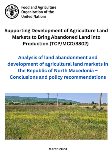
Analysis of land abandonment and development of agricultural land markets in the Republic of North Macedonia – Conclusions and policy recommendations
01/03/2023
This report, conducted under the FAO Technical Cooperation Project "Supporting Development of Agriculture Land Markets to Bring Abandoned Land into Production" in North Macedonia, examines land abandonment amidst current farm structures and land market dynamics. It provides policy recommendations to prompt further action in effectively addressing this pressing issue in the Macedonian agricultural sector.

The potential of multi-purpose land consolidation in Eastern Europe
12/09/2022
Multi-purpose land consolidation instruments hold significant potential in Eastern European countries, facilitating agricultural development, while also enabling land use changes in connection with public projects for nature restoration, environmental improvement, climate change adaptation, and mitigation. This paper explores Western European and Eastern European experiences with multi-purpose land consolidation, and how it can accelerate the development of land consolidation programmes.
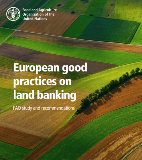
European good practices on land banking - FAO study and recommendations
01/03/2022
Land banking in Western Europe aids agriculture and rural development, reducing land fragmentation and enabling farm enlargement. It aligns with land consolidation, serving multiple purposes and supporting agricultural growth and public projects in rural areas. This study examines European practices, Central European experiences, and provides policy recommendations for introducing land banking in Eastern Europe and Central Asia.
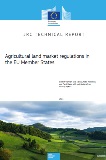
Agricultural land market regulations in the EU Member States 2021
06/06/2021
This publication is a technical report by the Joint Research Centre (JRC), the European Commission’s science and knowledge service. It provides vital scientific insights for EU policymaking. Analyzing 24 diverse measures in 22 Member States, it covers tenant & owner protection, fragmentation prevention, and more, revealing significant regulatory variations in Europe's agricultural land market.
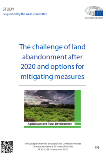
The challenge of land abandonment after 2020 and options for mitigating measures
01/12/2020
This study analyzes land abandonment in the EU, exploring its consequences and mitigation options. It presents historical trends and the current state of land abandonment, projecting future developments by 2030. Through desk research and case studies, it proposes mitigating actions within the EU's Common Agricultural Policy (CAP). The study also outlines scenarios considering climate change, global market globalization, and major health crises' impact on land use changes.
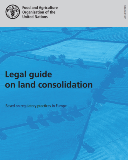
Legal guide on land consolidation - Based on regulatory practices in Europe
01/03/2020
Land consolidation is a highly effective land management instrument that allows for the improvement of the structure of agricultural holdings and farms in a country, enhancing their economic and social efficiency. This legal guide offers detailed legislative guidance based on European good practices from Denmark, Finland, Germany, Lithuania, the Netherlands, Serbia, Spain and Turkey.
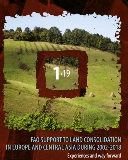
FAO support to land consolidation in Europe and Central Asia during 2002-2018 - Experiences and way forward
01/05/2019
Governments throughout the Europe and Central Asia (ECA) region have recognized the need to address structural problems with land fragmentation hampering agriculture and rural development. This has led to the introduction of land management instruments such as land consolidation and land banking. Since 2002, FAO has supported member countries in the ECA region to introduce and operationalize National Land Consolidation Programmes.
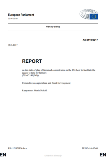
Report on the state of play of farmland concentration in the EU: how to facilitate the access to land for farmers
30/03/2017
This report explores the pressing issue of farmland concentration in Europe, analyzing its impact on agriculture and society. Uncovering reasons behind its rise, we shed light on the challenges it poses. Highlighting the imperative of farmer access to land, this publication advocates for equitable and sustainable agricultural practices, fostering an inclusive and resilient European farming sector.
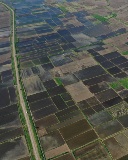
Experiences with land consolidation and land banking in Central and Eastern Europe after 1989
01/01/2015
This paper reviews the experiences of introducing land consolidation and land banking instruments in Central and Eastern Europe addressing the structural problems of small and fragmented farms. The introduction has been uneven with some countries having established operational programmes while others have taken steps with differing levels of success, and a few have not taken action. The paper assesses the driving factors for the introduction and the approaches used in individual countries.
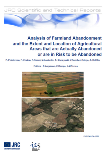
Analysis of farmland abandonment and the extent and location of agricultural areas that are actually abandoned or are in risk to be abandoned
01/06/2008
This publication explores the impact of farmland abandonment (FLA) on the Utilized Agricultural Area (UAA) in EU Member States over three decades. With a focus on causes and risk criteria, the study tests its methodology in key agricultural countries and diverse test-regions. Proposing FLA risk indicators and improved methodologies, the study informs policies under the Common Agricultural Policy (CAP) reform, safeguarding agricultural areas and the environment.
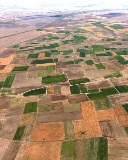
The design of land consolidation pilot projects in Central and Eastern Europe
01/01/2003
This FAO's Land Tenure Study offers concise insights into the complex realm of land tenure and its role in promoting sustainable rural development, thereby reducing poverty and hunger. This comprehensive guide offers expert advice, equipping countries with actionable recommendations to kickstart their own land consolidation pilot projects and unleash the transformative potential of land consolidation to enhance agricultural competitiveness and propel rural development forward.


